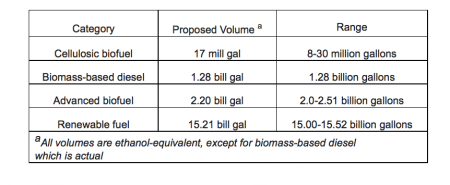WASHINGTON – The U.S. Environmental Protection Agency announced today (Nov. 15) it is planning to lower the levels of renewable fuels that must be blended into gasoline and diesel.
The blend is required by Congress under the Energy Independence and Security Act of 2007.
Still pending public comment, the proposal to reduce the required volume obligation (RVO) for the federal Renewable Fuel Standard (RFS) affects renewable fuels in all motor vehicle gasoline and diesel produced or imported by the United States in 2014.
In its announcement, the EPA said it was “seeking input on different approaches to address the ‘E10 blend wall.’”
The proposal proposes a level of 15.21 billion gallons total renewable fuel volumes for 2014.
Rationale
Nearly all gasoline sold in the U.S. is now “E10,” which is fuel with up to 10 percent ethanol.
At the same time, advances in vehicle fuel economy and other economic factors have pushed gasoline consumption far lower than what was expected when Congress passed the Renewable Fuel Standard, or RFS, in 2007.
As a result, the EPA claims we are now at the “E10 blend wall,” the point at which the E10 fuel pool is saturated with ethanol.
The standards determine how much renewable fuel a refiner or importer is responsible for, and are the standards designed to achieve the national volumes for each type of renewable fuel.
The proposal will be open to a 60-day public comment period. (Story continues below chart)
Quick reactions
U.S. Sen. Debbie Stabenow, D-Mich., chairwoman of the U.S. Senate Committee on Agriculture, Nutrition and Forestry, said the proposal would pull the rug out from underneath an American-made energy sector .
“The so-called blend wall is a crisis manufactured by the oil industry,” Stabenow said in a released statement.
“The proposed rule could cost thousands of good paying clean energy jobs and mean less competition at the pump.”
But in his released statement, Agriculture Secretary Tom Vilsack tried to bolster the administration’s case.
“It’s important to take a long-term approach to the RFS.
“Clearly, as governor of Iowa and as U.S. Secretary of Agriculture, my support for the RFS has been steady and strong,” Vilsack said. “But I also believe that improved distribution and increased consumer use of renewable fuels are critical to the future of this industry.”
Farm groups not happy
Both the National Farmers Union (NFU) and American Farm Bureau Federation (AFBF) voiced disappointment with the EPA’s decision. NFU President Roger Johnson’s statement blasted the oil industry, saying, “Big oil has determined that biofuels are taking their market share, so they have prevented increased amounts of biofuel to be sold at gas stations.”
“At a time when advanced and cellulosic biofuel plants are just starting to come online, the EPA is sending a negative signal, which will stifle investment.”
Likewise, AFBF President Bob Stallman said industry investment will be thwarted by the proposal.
“The intent of the Renewable Fuels Standard revised in 2007 (RFS2) was to get more renewable fuels into our nation’s pipeline and move beyond the E10 fuel blend,” Stallman’s statement said. “Today’s announcement from EPA moves us in the opposite direction.
“This decision has the potential to pull the plug on new technologies and investments that are currently in place and needed to produce advanced biofuels.
Advanced Ethanol Council Executive Director Brooke Coleman said the EPA is “in the right ballpark for cellulosic biofuels, and we are confident that the final number will be the right one for the industry in 2014.
“But bigger picture issues must be resolved in the final rule because advanced biofuel investors also pay attention to the big picture.”
Coleman called reductions to the advanced biofuel pool “unnecessary.”
“What we’re seeing is the oil industry taking one last run at trying to convince administrators of the RFS to relieve the legal obligation on them to blend more biofuel,” added Coleman.
Economic woes predicted
The National Biodiesel Board warned the EPA’s proposal for 2014 volumes under the Renewable Fuel Standard would cause plant closures and layoffs in the U.S. biodiesel industry.
“This proposal, if it becomes final, would create a shrinking market, eliminate thousands of jobs and likely cause biodiesel plants to close across the country,” claimed Anne Steckel, board vice president.
“It also sends a terrible signal to investors and entrepreneurs that jeopardizes the future development of biodiesel.”
She said biodiesel production is on track to set a production record exceeding 1.7 billion gallons this year, using a mix of feedstocks including recycled cooking oil, agricultural oils and animal fats.
The EPA’s proposed rule for next year would set biodiesel volumes at 1.28 billion gallons while shrinking the overall Advanced requirement to 2.2 billion gallons.












I wood like to see the ethanol in fuel reduced it destroys the older tractors engines